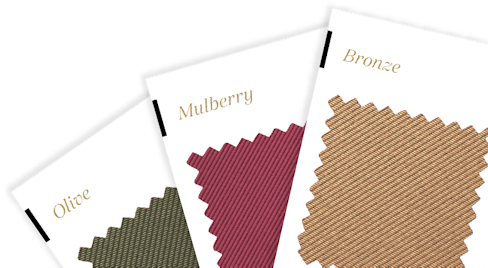Should You Wear a Tuxedo or a Suit for a Wedding?

Just got engaged? Check out our new Groom's Guide!
Wedding bells are soon to be ringing and you have most of the big day planned. There’s just one problem – the groom and his groomsmen aren’t kitted out yet. The reason being, the wedding party is struggling to choose between tuxedos and suits for the wedding.
It’s a tough choice to make, and several factors may influence your decision.
Introduction to Tuxedos and Suits for Weddings
Perhaps the most important thing to remember about wedding attire is that it’s not all about the groom. Yes, the groom will be center stage and his choice matters. But he must also account for his groomsmen, and how their clothes will align with both his and the wedding’s theme, as well as setting a dress code for the other guests.
For instance, imagine a wedding where the groom and his groomsmen all wear suits, yet some guests turn up in tuxedos. The guests would look out of place, perhaps even upstaging the groom. It’s avoiding situations like these that’s the main reason why you need to make decisions on attire as early as possible.
Tuxedos vs. Suits: The Basics
The terms “tuxedo” and “suit” aren’t interchangeable, and there are several key differences:
- Tuxedos are generally considered a more formal choice than regular suits, with the latter being as common in business settings as they are at weddings.
- Suits don’t tend to incorporate any satin. Tuxedos may have satin facings on the buttons, pocket trims, lapels, and even satin side strips on the trousers.
- You’ll typically wear a bow tie with a tuxedo (though some other ties are acceptable), whereas suits are either worn with ties or no neck decoration.
- Some tuxedos, particularly those following the traditional design model, have long tails at the rear. Suits lack these tails.
As for the choice between the two, it comes down to the level of formality the marrying couple wants to achieve at their wedding. If they want a full black-tie affair, tuxedos across the entire wedding party (grooms and groomsmen) may be preferred, with guests having the option of a suit or tux. More casual weddings will result in tuxedos looking out of place.
Role-Based Recommendations: Groom, Groomsman, Guest
Dean Martin once said, “In a tuxedo, I’m a star. In regular clothes, I’m a nobody.” No groom wants to feel like a “nobody” at their wedding, and every other man who attends takes their cues from the groom in terms of what to wear. Traditional expectations of your dress differ based on your role, as explained below.
The Groom
Grooms set the dress standard for their weddings, and their attire should match the theme. A formal wedding, especially one conducted in the evening, is ideal for tuxedos given the tux’s reputation as eveningwear. A daytime wedding may call for a regular suit, both because it’s more casual and more traditionally accepted as daytime clothing.
Ultimately, it depends on your wedding’s dress code. A white or black-tie event is formality personified, with a tuxedo being the ideal form of dress. A formal, cocktail, or dressy casual wedding gives you more options, with suits being preferred for the latter two, while you can choose between a tux or suit for a formal wedding.
The Groomsmen
Groomsmen usually take their cues from the groom in terms of what to wear. If the groom wears a tuxedo, the groomsmen usually wear them, too. The same goes for suits – a groomsman in a tux will upstage a groom who wears a suit and look out of place in the wedding party.
Matching or complementing the groom’s style of attire is also important. Color schemes should align, as should the general design of the suit or tuxedo. You’ll also often find that groomsmen wear matching suits or tuxes, sometimes chosen by the groom.
The Guests
As a guest at a wedding, your invitation is your first port of call when deciding what to wear. The bride and groom will usually specify a dress code (more on that below), which you’re expected to follow. Failing to adhere to that dress code, such as wearing a tux to a wedding that specifies casual attire, is a faux pas that could upset the groom and the rest of his wedding party.
How to Choose Between a Tuxedo and Suit
Now we come to the important question – should you choose a tuxedo or a suit for your wedding?
Much of your decision comes down to personal style, given that both are acceptable choices. Those who love the formal look may favor tuxedos, whereas men who prefer a slightly more casual feel, or those who want more variety in design options, may lean toward suits.
But beyond your own sense of style, there are two factors to consider when choosing between a suit and a tuxedo.
Decoding the Wedding Dress Code
The bride and groom will decide on a dress code ahead of the wedding, which they communicate to their guests via their invitations. The following are the four most common types of wedding dress codes and what they mean for the attire you’ll choose.
Black Tie
GQ Magazine defines black tie as a formal dress code that “transcends the standard suit and tie.” In other words – it’s the dress code of choice if you want tuxedos at your wedding. A typical black-tie outfit involves a black bow tie (hence the name), coupled with a white shirt, black tuxedo jacket, black trousers, and appropriate shoes. You’ll usually wear cufflinks on your shirt’s wrists and keep the collar turned down.
Formal
Despite the name, formal is actually a step down in formality compared to black tie. Tuxedos are accepted, though they’re optional. A sharp suit is also a good choice for this dress code, with groomsmen having to ensure their suit matches the theme that the groom chooses. Guests have a little more freedom unless the wedding party states a specific theme they’d like guests to follow.
Semi-Formal
Tuxedos fall out of favor once you reach the semi-formal stage and suits become the attire of choice. Again, the wedding party’s theme has to be taken into consideration, though there’s often a less strict approach to what you wear. Dress shirts and slacks are common, with suit jackets being either optional or only required during the wedding ceremony and for pictures.
Casual
While it’s not accurate to say that anything goes with a casual dress code (you won’t rock up in a worn-out t-shirt and ripped jeans, for example), there’s a lot more leeway with this dress code. Khakis and collared shirts are common, and you’ll likely be able to get away with not wearing a tie or even a full suit. Tuxedos are a definite no-go for the casual style.
Considering the Time and Season
When it comes to matching your attire to the time and season of the wedding, stick to a simple rule – tuxedos are for the evening.
In other words, tuxedos are traditionally considered evening attire, so they’ll often seem out of place at a daytime wedding or a wedding that takes place during the height of summer. Suits are usually preferred for these types of weddings.
A tux is a more viable option if you have an evening ceremony. The same goes if the ceremony will have a lot of pomp and circumstance, such as a large indoor wedding in a ballroom or similar venue. It’s also worth noting that many consider it bad form to remove a tuxedo jacket, which is another strike against the tux for summer weddings.
Where to Find Your Perfect Wedding Attire
By now, you may have an idea of the type of wedding attire you’ll choose for your wedding. Those going down the more formal route may lean toward tuxedos, with more casual affairs being the domain of suits. Regardless of your choice, you need to find a good place to get your attire:
- Generation Tux – Offering both suits and tuxedos to rent, Generation Tux gives you a low-cost way to find the perfect wedding attire. You can also rent accessories and shoes, with everything being delivered 14 days before your wedding and coming with a fit guarantee.
- The Black Tux – The Black Tux stands out because of its “Home Try-On” program. Customers receive a tuxedo or suit based on the measurements they provide and have three days to try the attire, send questions, and arrange for tweaks. The Black Tux uses this information to ensure a good fit for the actual attire they send later.
- Bonobos – Reasonable prices on suits and tuxedos combine with the ability to order your attire or buy it in-store with Bonobos. They’re a little less versatile than other options (they only offer black tuxedos, for instance), but you get a generous 45-day returns policy.
Accessories to Accent Your Tuxedo or Suit
Whether you choose a suit or tuxedo, your accessories complete your wedding attire to create a more cohesive look.
First, the basics. Cufflinks are usually a good addition to wedding attire, especially for the more formal tuxedo. The style of your cufflinks can vary based on your preferences, though simple geometric shapes (circles and squares) or patterned cufflinks based on the wedding’s theme are common.
You’ll also find that most tuxedos come with pocket squares, which either match the color of the bow tie or the wedding’s specific color theme. They’re not required for suits, though the right pocket square helps to make a suit jacket pop, especially when combined with a buttonhole that aligns with the square’s colors.
Finally – neckwear.
Bow ties are the traditional choice for tuxedos, to the point where it’s very rare for people to accessorize a tux with a regular tie. But a bow tie often looks out of place with a suit, leading to most preferring ties or, in the case of casual weddings, nothing at all.
Choosing the Right Accessories for Your Look
If you’re struggling to find the right accessories to match your outfit and enhance your look, these quick tips may help:
- Use the wedding’s theme (especially its colors) as your guide when choosing your accessories.
- Match your pocket square to your necktie for more formal looks, or match it to the wedding’s theme if you have casual attire.
- If you wear a belt (usually with a suit), make sure its color matches that of your shoes.
- Consider accentuating your tie with a tie bar to create contrast and uniformity.
- Remember that cufflinks are almost mandatory for a tuxedo, but are considered optional with a suit.
Final Thoughts: Making Your Decision
Personal comfort and style are just as important as etiquette and the wedding’s setting when choosing between a tuxedo and suit. Yes, tuxedos are more formal. But they can also be less comfortable than suits, especially for summer weddings when high temperatures can make a tux feel stuffy.
Make your decision based on how you wish to feel and the atmosphere you want to convey during your wedding. Ultimately, the outfit you feel best in is the right choice.

Matt Ramirez
Matt Ramirez, a dedicated marketing expert has been with Generation Tux since 2020 after spending 15+ years with global lifestyle brands. With years of experience, he specializes in creating memorable moments for weddings and special occasions. A passionate advocate for classic style and modern convenience, Matt is a trusted voice in men’s fashion.
Link to bio pageFeatured Products
Get started.
Stylish suits and tuxedos delivered straight to your door. See our collection and rent now.

